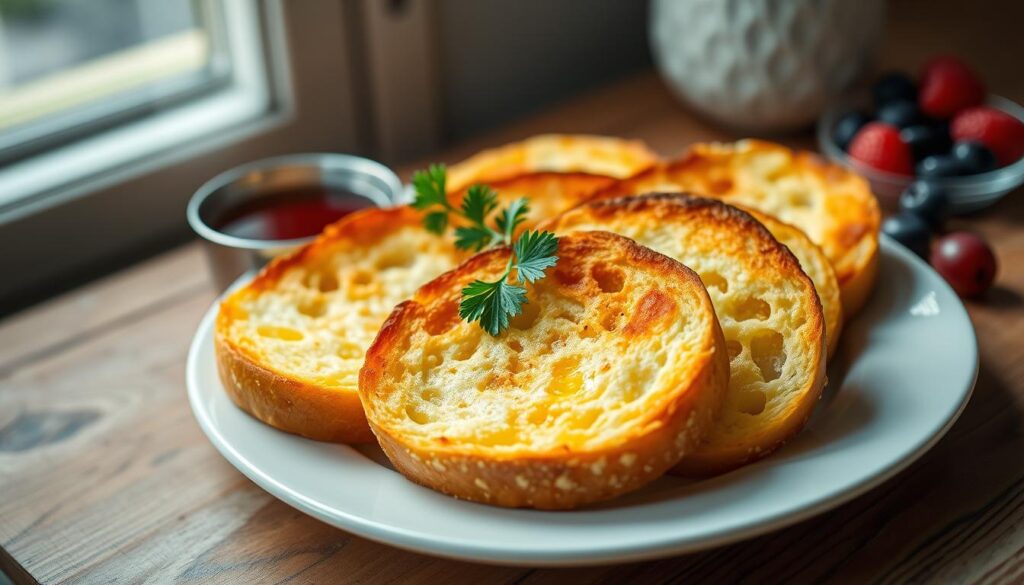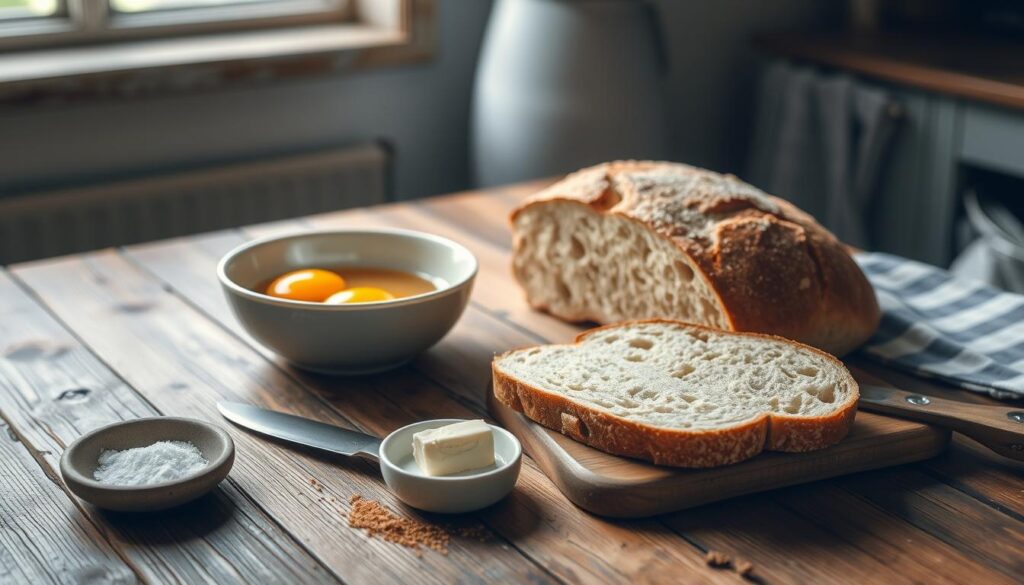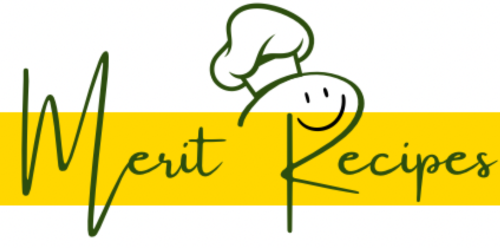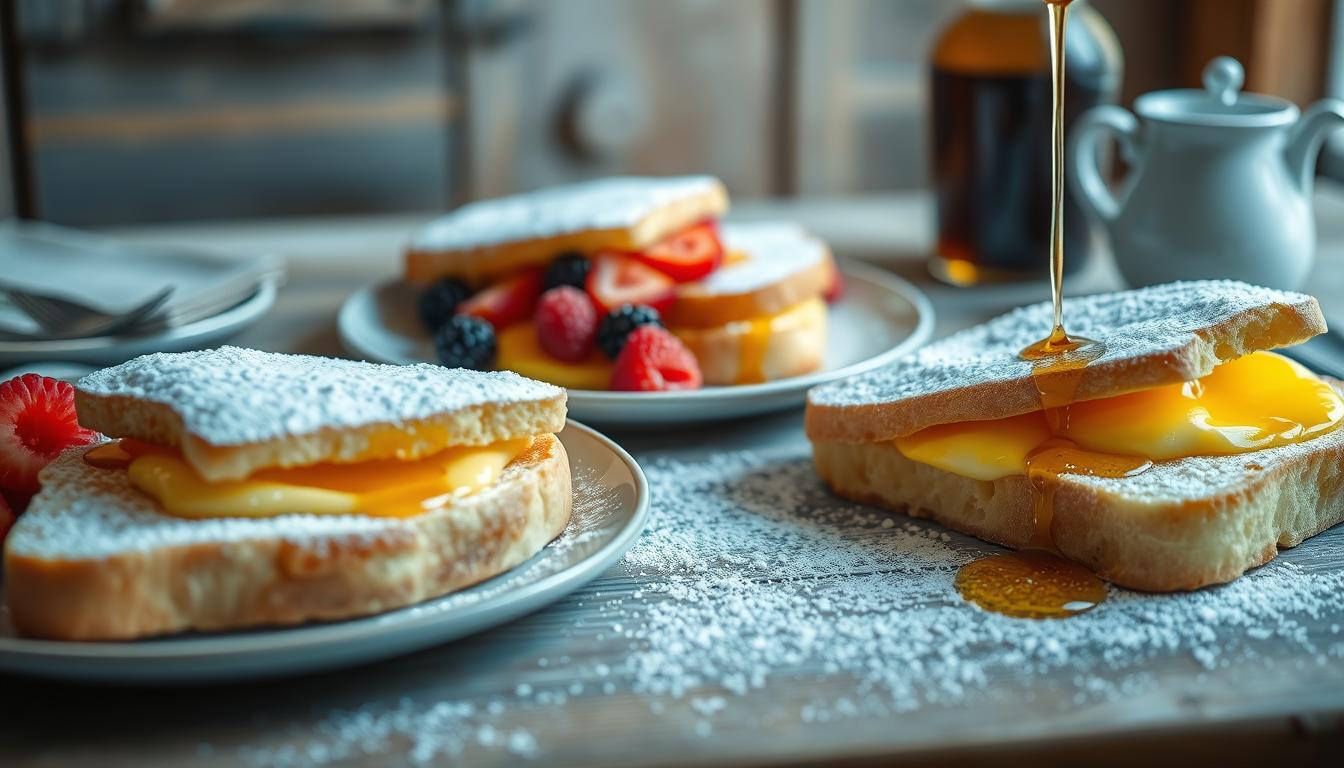French Toast vs. Eggy Bread: Understanding the Difference
French toast and eggy bread are often used interchangeably, but they have subtle differences. Typically, French toast is made with thicker bread slices, creating a richer texture. Meanwhile, eggy bread tends to use everyday bread and is often simpler in preparation.
Start by mixing eggs, milk, and spices in the right amounts. The egg-to-milk ratio is key for the texture and taste.
What are the common mistakes to avoid when making eggy bread?
Avoid over-mixing the egg mixture, using the wrong bread, and cooking at the wrong temperature. These mistakes can affect the final result.
What are some sweet and savory topping ideas?
There are many topping options to try. For sweet, use maple syrup and fruit. For savory, try spinach and feta. You can also experiment with special holiday toppings.
What is the difference between French toast and eggy bread?
French toast and this dish are similar but have distinct origins and preparation methods. They also vary in taste and preparation styles around the world.
How do I choose the right bread for my recipe?
Choosing the right bread is key to getting the perfect result. Consider the bread’s density, texture, and flavor, and select one that suits your personal preference.
Troubleshooting Your Eggy Bread Problems
Even with the best recipe and techniques, things can go wrong. Troubleshooting common problems is key to getting it right. Issues like a too-dense or too-soggy texture, a lack of flavor, or a burnt crust can happen.
Start your day with a tasty, golden crust breakfast treat. Eggy bread is easy to make and loved by all. It’s perfect for busy mornings with its crispy outside and soft inside.
Making perfect golden slices of eggy bread is simple,
whether you’re a pro or a beginner. We’ll cover the science of the golden crust and share topping ideas. Follow our tips to make delicious eggy bread that everyone will love.
Key Takeaways
- Learn how to make perfect golden slices of eggy bread in minutes
- Discover the science behind the golden crust and how to achieve it
- Get tips and tricks for making eggy bread, from preparation to presentation
- Explore various topping ideas to elevate your eggy bread game
- Master the art of making eggy bread with our easy-to-follow guide
- Enjoy a delicious breakfast that’s sure to please even the pickiest eaters
What Makes the Perfect Eggy Bread
To make the perfect eggy bread, you need to know about the golden crust. The Maillard reaction is key. It’s a chemical process that makes the bread golden and crispy, just like French toast.
For a great eggy bread, it’s all about the heat and egg mix. The bread type matters too. A smooth, balanced egg mixture is essential for a creamy texture.

Mastering these traits and using the right cooking techniques will give you perfect eggy bread. The egg mixture is crucial. It makes the bread crispy and fluffy.
Essential Ingredients for Classic Eggy Bread
Choosing the right ingredients is key to making classic eggy bread. The type of bread types used can change the texture and taste. Challah or brioche are good choices because of their rich, eggy flavor and dense texture.
The egg quality matters a lot. Fresh eggs will give you a better texture and taste. Also, milk alternatives like almond or soy milk are great for those with dietary restrictions. Here are some must-have ingredients:
- High-quality eggs for a rich, creamy texture
- Dense, eggy bread types such as challah or brioche
- Milk alternatives for those with dietary restrictions

By picking the right ingredients, you can make a tasty and satisfying classic eggy bread.
« The key to making great eggy bread is using high-quality ingredients and paying attention to the details of the recipe, » says a culinary expert.
| Ingredient | Importance | Alternatives |
|---|---|---|
| Eggs | High | None |
| Bread types | Medium | White bread, whole wheat bread |
| Milk alternatives | Low | Almond milk, soy milk, coconut milk |
The History and Origins of Eggy Bread Around the World
Eggy bread, also known as French toast, has a rich breakfast history that spans continents. It has evolved over time, influenced by many cultures. This has led to a wide range of flavors and textures in global cuisine.
Starting in medieval Europe,
eggy bread has spread to America, Asia, and more. It has been shaped by local ingredients and cooking methods. This has created unique and tasty variations.
These are dipped in eggs, milk, and sugar, then cooked until golden.
Cultural Variations Across Continents
Eggy bread has been adapted to fit local tastes and ingredients worldwide. In some places, it’s a sweet dish with fruits or syrups. In others, it’s savory with meats or vegetables. Its breakfast history shows its versatility and popularity in global cuisine.
- French toast with maple syrup and bacon in North America
- Eggy bread with strawberries and cream in Europe
- Bread dipped in egg and spices, served with curry in Asia
These examples show the diversity and richness of eggy bread in global cuisine. It’s a key part of breakfast history.
Choosing the Right Bread for Your Recipe
Choosing the right bread is key to making great eggy bread. Different breads change the texture and taste of your dish. For example, challah or brioche makes the inside rich and custard-like. White or whole wheat bread makes it fluffier.
The bread’s texture matters too. Softer breads soak up more egg, making the dish tender. Firmer breads keep their shape and add crunch. Flavor is also important. Breads like sourdough or cinnamon add unique tastes.
Here are some breads you can use for eggy bread, along with their characteristics:
- Challah: dense, rich, and custard-like
- Brioche: soft, tender, and slightly sweet
- White bread: light, fluffy, and neutral in flavor
- Whole wheat bread: nutty, earthy, and slightly denser than white bread
In conclusion, the right bread makes a big difference in eggy bread’s texture and taste. Think about texture, flavor, and what you like. This way, you can pick the perfect bread for your recipe and enjoy a tasty dish.
| Bread Type | Texture | Flavor |
|---|---|---|
| Challah | Dense | Rich and custard-like |
| Brioche | Soft | Slightly sweet |
| White bread | Light | Neutral |
| Whole wheat bread | Denser | Nutty and earthy |
Step-by-Step Eggy Bread Preparation Method
To make the perfect eggy bread follow a step-by-step guide.
Start by mixing eggs, milk, and spices in the right amounts. The egg-to-milk ratio is key for the texture and taste.
Next, focus on soaking the bread. Soak it in the mixture for the right time to soak up flavors and get the right texture. Soaking too long or too short can ruin the bread.
Finally, cook the bread to a golden crust. The cooking temperature is crucial. The right temperature and time ensure the bread is cooked well and crispy.
- Use fresh eggs and milk for the best flavor
- Soak the bread for the right amount of time to achieve the perfect texture
- Cook the eggy bread at the ideal temperature to get a golden crust
By following these steps and tips, you’ll make delicious eggy bread. Try different egg mixture ratios and soaking techniques to find your favorite. And remember, mastering the cooking temperature is key for that golden crust.
| Ingredient | Quantity | Importance |
|---|---|---|
| Eggs | 2-3 | High |
| Milk | 1 cup | Medium |
| Spices | 1 tsp | Low |
Common Mistakes to Avoid When Making Eggy Bread
When making eggy bread, it’s easy to make mistakes. Troubleshooting these issues is key to achieving perfect golden slices. One common mistake is over-mixing the egg mixture, which can make the bread dense and tough. To avoid this, mix the eggs gently and briefly, just until the ingredients are combined.
Another mistake is using the wrong type of bread. Cooking tips suggest using a bread that is sturdy enough to hold the egg mixture, but still soft and fluffy. Suitable bread types include Challah, brioche, or a crusty baguette. By choosing the right bread and avoiding over-mixing, you can ensure your eggy bread turns out light and delicious.
Here are some additional common mistakes to watch out for:
- Not soaking the bread long enough, resulting in a dry or undercooked texture
- Cooking the eggy bread at the wrong temperature, leading to a burnt or undercooked exterior
- Not using enough egg mixture, resulting in a dry or flavorless final product
By being aware of these common mistakes and taking steps to avoid them, you can ensure your eggy bread turns out perfectly every time. With a little practice and patience, you’ll be a pro at making delicious eggy bread in no time, and troubleshooting will become second nature. Remember to always follow cooking tips and guidelines to achieve the best results.
Sweet and Savory Topping Ideas
Eggy bread is a versatile dish that can be enjoyed with many toppings. You can choose from classic sweet toppings or try new savory ones. The options are endless.
For special occasions, think outside the box. Use fresh fruits, nuts, or chocolate shavings to make your eggy bread elegant.
Classic Sweet Combinations
Some classic sweet toppings include:
- Maple syrup and fresh fruit
- Powdered sugar and cinnamon
- Honey and almonds
Innovative Savory Options
For a savory twist, try these toppings:
- Spinach and feta cheese
- Smoked salmon and cream cheese
- Mushrooms and truffle oil
Special Occasion Toppings
For special occasions, mix sweet and savory toppings. Some ideas are:
- Caramelized bananas and crispy bacon
- Fig jam and prosciutto
- Pear and gorgonzola cheese
These ideas are just a starting point. Don’t be afraid to try new combinations. Find your favorite sweet and savory pairings for special occasions.
| Topping Idea | Sweet or Savory | Special Occasion |
|---|---|---|
| Maple syrup and fresh fruit | Sweet | No |
| Spinach and feta cheese | Savory | No |
| Caramelized bananas and crispy bacon | Both | Yes |
Making Ahead and Storage Tips
Making eggy bread ahead of time is a great idea. It saves you time in the morning or for big events. With the right storage and reheating, you can enjoy it whenever you like.
To make ahead, prepare it but don’t cook it. Put it in an airtight container in the fridge or freezer. Here are some tips for storage:
- Store in an airtight container to maintain freshness
- Keep in the fridge for up to 24 hours or freeze for up to 2 months
- Label and date the container so you know how long it’s been stored
Freezing Guidelines
Freezing is a good way to store eggy bread for longer. Wrap it tightly in plastic wrap or aluminum foil to avoid freezer burn. You can also use a freezer-safe bag for extra protection.
Reheating Methods
Reheating eggy bread is simple and can be done in several ways. Here are some methods to try:
- Toaster or toaster oven: Simply place it in the toaster or toaster oven and cook until crispy and golden brown
- Microwave: Place it in the microwave and cook for 20-30 seconds, or until heated through
- Oven: Place it in the oven at 350°F (180°C) for 5-10 minutes, or until crispy and golden brown
By following these tips, you can enjoy delicious eggy bread anytime. You won’t have to worry about losing quality or convenience.
| Storage Method | Storage Time | Reheating Method |
|---|---|---|
| Fridge | Up to 24 hours | Toaster or toaster oven |
| Freezer | Up to 2 months | Microwave or oven |
Dietary Variations and Substitutions
Is can be made to fit many dietary needs. You can find substitutions and dietary variations for gluten-free, vegan, or dairy-free options. This way, you can still enjoy this tasty dish.
For gluten-free bread,
try Udi’s, Glutino, or Schar. You can also make your own with almond or coconut flour. For vegan choices, flaxseed or chia seeds can replace eggs, and use almond or soy milk instead of regular milk.
Here are some ideas for dietary variations and substitutions:
- Use gluten-free bread to make it
- Replace eggs with flaxseed or chia seeds for a vegan option
- Use non-dairy milk such as almond or soy milk for a dairy-free option
With a bit of creativity, you can make it that fits your dietary needs.
| Dietary Variation | Substitution | Example |
|---|---|---|
| Gluten-free | Gluten-free bread | Udi’s, Glutino, Schar |
| Vegan | Flaxseed or chia seeds | Replace eggs in eggy bread recipe |
| Dairy-free | Non-dairy milk | Almond or soy milk |
Professional Chef Tips for Restaurant-Quality Results
To elevate your eggy bread, mastering a few key techniques is crucial. With the right professional chef tips, you can impress your family and friends with restaurant-quality dishes.
Temperature control is key to making great eggy bread. This includes the pan’s heat and the ingredients’ temperature. For instance, using room temperature eggs ensures a more even cook.
Temperature Control Secrets
- Use a thermometer to ensure your pan is at the right temperature
- Let your ingredients come to room temperature before cooking
- Don’t overcrowd your pan, as this can lower the temperature
Plating Techniques
Presentation is everything with eggy bread. Simple plating techniques can transform a basic dish into a stunning breakfast or brunch option. Adding fresh herbs or edible flowers can add a burst of color.
By following these professional chef tips, you’ll master temperature control and plating techniques. This will help you create restaurant-quality eggy bread that wows even the most discerning palates.
| Tips | Benefits |
|---|---|
| Use high-quality ingredients | Improved flavor and texture |
| Don’t overcook the eggs | Moist and creamy eggs |
| Experiment with different toppings | Unique and delicious flavor combinations |
Troubleshooting Your Eggy Bread Problems
Even with the best recipe and techniques, things can go wrong. Troubleshooting common problems is key to getting it right. Issues like a too-dense or too-soggy texture, a lack of flavor, or a burnt crust can happen.
To fix these problems, try these solutions:
- Adjust the amount of egg mixture to achieve the right texture.
- Add flavorings such as vanilla or cinnamon to enhance the taste.
- Monitor the cooking temperature and time to prevent burning.
By tackling these common problems, your dish will be delicious. Troubleshooting is crucial for mastering the recipe. With these solutions, you’re on your way to a tasty meal.
Remember, practice makes perfect. Don’t get discouraged if your first tries don’t work out. Keep trying, and you’ll become a pro. For more tips, check out our other cooking and recipe articles.
Conclusion: Mastering the Art of Perfect Eggy Bread
As we wrap up our journey, it’s clear that making this dish perfect is all about balance. It’s about knowing the right techniques and adding a bit of creativity. We’ve covered everything from the science of the golden crust to trying out new toppings.
If you’re new to cooking or already skilled, this guide has you covered. It’s all about the little things, like choosing the right bread and cooking at the right temperature. With some practice and passion, you’ll soon be making restaurant-quality results.
Now, it’s time to get creative. Try out different ingredients and flavors. Make it your own. The world of possibilities is endless, and the joy of mastering the recipe is worth it.

